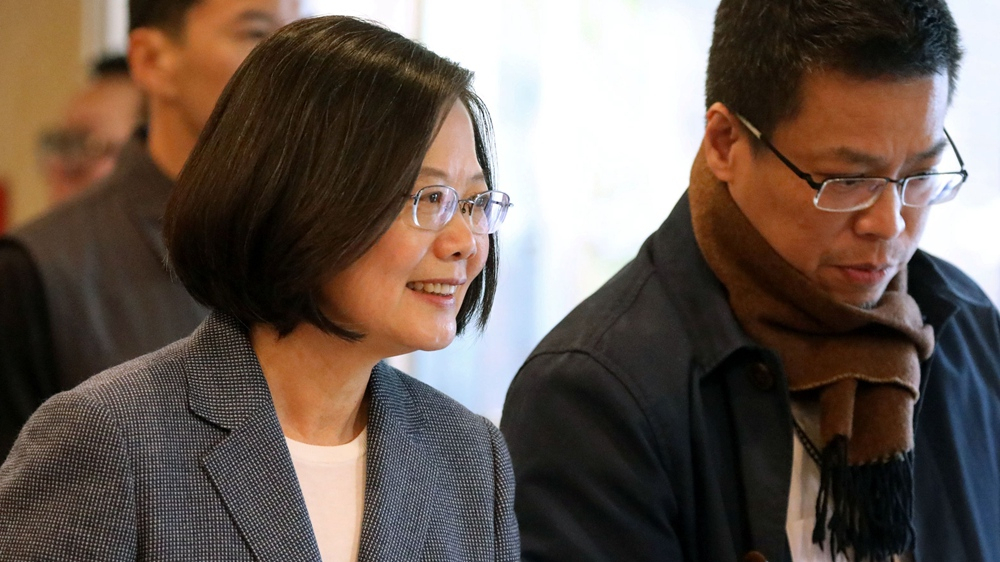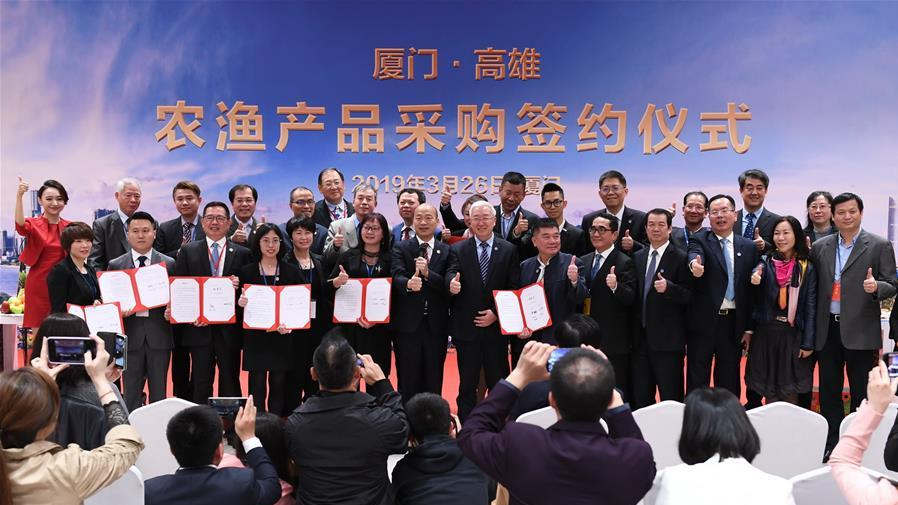
Taiwan leader Tsai Ing-wen (L) leaves after the second live policy address ahead of January's election in Taipei, December 25, 2019. /Reuters Photo
Taiwan leader Tsai Ing-wen (L) leaves after the second live policy address ahead of January's election in Taipei, December 25, 2019. /Reuters Photo
Editor's note: Tian Feilong is an associate professor at the Law School of Beihang University and Deputy Secretary-General of the One Country Two Systems Youth Forum. The article reflects the author's opinion, and not necessarily the views of CGTN.
The Hong Kong protests, which first started in June 2019, have persisted for more than six months and attracted extensive global media attention. Undeniably, local protesters have played a major role in starting and furthering the protests, however, the agitation and turmoil in the city would also have not endured for so long without the overwhelming external influence that protesters have ardently solicited and welcomed during the protests.
Amidst this concerted international campaign to aggravate tensions and foment unrest in the city, Taiwan has played an indispensable part. The island currently shares a bumpy relationship with the Chinese mainland due to its incumbent leader Tsai Ing-wen's so-called independence-leaning stance. And by influencing the Hong Kong protests and utilizing the opportunity it offers to amplify the anti-mainland rhetoric, forces hostile to the Chinese mainland on the island have been able to score a major gain.
How is Taiwan involved in the Hong Kong protests? Like the Western media, most Taiwan media outlets have been extremely biased in covering these protests. They have stood firm with protesters while pouring vitriolic criticisms on the Hong Kong police and the Hong Kong SAR government. This has helped to form increasing "moral support" to Hong Kong protesters within Taiwan and a willingness to lend a helping hand to them. And as far as the direct involvement is concerned, the island's New Power Party has been continuously providing guidance and assistance, which includes funds and supplies, to demonstrators to help with their "cause".
Now, these protests are creating an impact not only in Hong Kong, but also in Taiwan. Within the island, there has been active political maneuvering to exacerbate the nearing "China threat". How exactly?
As Taiwan's leadership election which happens every four years looms, the Democratic Progressive Party (DPP) candidate Tsai Ing-wen has turned Hong Kong protests into a powerful political weapon to whip up the "China fear" which she hopes will boost her chance for re-election as someone running on a strictly anti-mainland narrative.

Han Kuo-yu (L7), mayor of Taiwan's Kaohsiung city, poses for a group photo after the signing ceremony of fruit and fishery product deals worth 30 million U.S. dollars with local enterprises in Xiamen, southeast China's Fujian Province, March 26, 2019. /Xinhua Photo
Han Kuo-yu (L7), mayor of Taiwan's Kaohsiung city, poses for a group photo after the signing ceremony of fruit and fishery product deals worth 30 million U.S. dollars with local enterprises in Xiamen, southeast China's Fujian Province, March 26, 2019. /Xinhua Photo
On January 2, 2019, Chinese President Xi Jinping delivered a speech on cross-Strait relations. Since then, Tsai has been sounding the deceptive alarm that the Chinese mainland is seeking reunification against Taiwan's will. Since the Hong Kong protests broke out last year, she has used the events to strengthen her case and argued more fiercely against the Chinese mainland. With slogans like "Today, Hong Kong; tomorrow, Taiwan," she has tried to create more anxiety and paranoia among Taiwan people about getting closer to the Chinese mainland.
Moreover, not only her, the "pro-independence" political figures have all been playing up the danger of closer relations with the Chinese mainland or any prospect of reunification, which they argue will cause Taiwan people to have their political values crushed and way of life altered, as demonstrated in Hong Kong's case.
This is, however, disregarding the fact that Hong Kong has remained one of the most prosperous places in the world since its handover to the Chinese mainland in 1997 and has done so under the "One Country, Two Systems" arrangement.
Such rhetoric is consistent with the narrative that anything related to the Chinese mainland is negative and that the Chinese mainland must be the cause for every problem. However, in reality, it is these external forces including foreign organizations, politicians, etc. that have been exacerbating the suspicions towards the Chinese mainland and happy to see the city engulfed in turbulence. In the meantime, the opposition forces in Hong Kong have also been extremely hostile throughout, which for many times, have brought the city to a standstill by their violent actions.
Riding on the high wave of manufactured suspicions towards the Chinese mainland, Taiwan's Democratic Progressive Party rushed the anti-infiltration law through the legislature on December 31 in 34 days without committee reviews or a public comment period. The law bars external hostile forces' "interference" in Taiwan, banning them from making political donations and political lobbying, but most importantly, it carries the implication that any connections with the Chinese mainland could be easily targeted, which could effectively put an end to any cross-Strait exchanges. This resembles Taiwan's martial law era from 1949 to 1987, and unfortunately will have damaging consequences for its future relationship with the Chinese mainland.
The wide range of tactics used in Taiwan to wage an anti-mainland campaign under the shadow of the ongoing Hong Kong protests will have significant bearings on where Taiwan is heading next. Now the election is taking place on January 11. We will see how these electoral strategies will pan out.
(If you want to contribute and have specific expertise, please contact us at opinions@cgtn.com.)